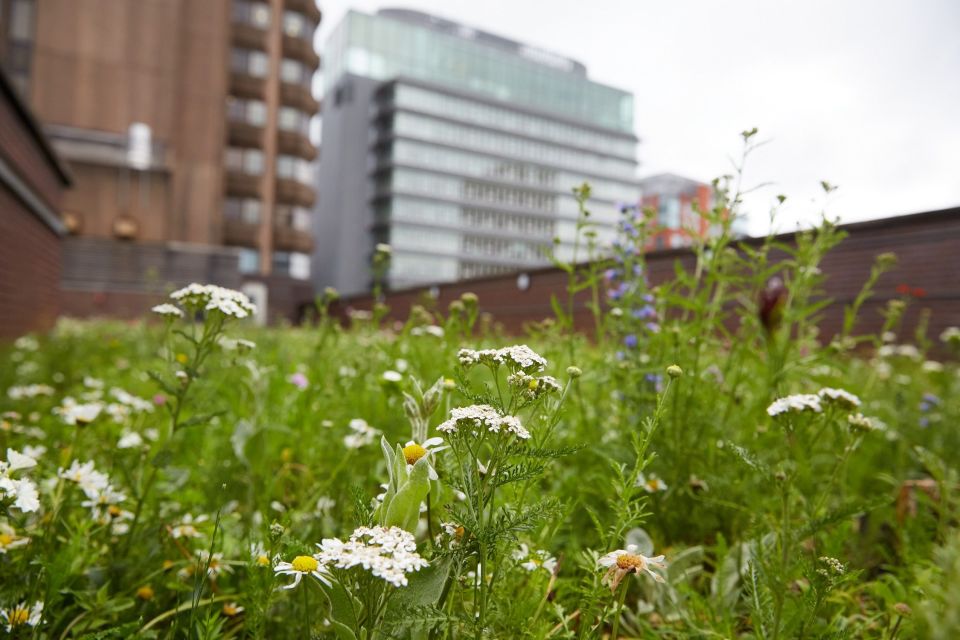Innovative roof offers climate resilient vision for Manchester
By Bruntwood Works

Work has been completed on the installation of a ground-breaking climate and water resilience research roof in the heart of Manchester.
Sited on Bloc – a city centre workspace that has been transformed by Bruntwood Works as part of its £50m Pioneer redevelopment programme – the blue-green roof from Polypipe Civils & Green Urbanisation will help to develop a greater understanding of how new construction and data technologies can help cities and urban developments to mitigate the impact of climate change and population growth, while enhancing biodiversity.
Over the next two years, the ‘smart’ blue-green roof, designed by environment management consultants EPG, part of the STRI Group, will allow United Utilities – which co-funded the development at Bloc – to assess how storing and re-using rainwater at roof level can reduce the volume of surface run-off entering its sewer network. As a result, it will help to lower the flood risk associated with the prolonged high-intensity storm events that are becoming increasingly frequent as the climate changes.
Unlike conventional green roofs, which use a drainage layer to simply remove rainwater, the 525 sq m blue-green structure retrofitted to Bloc’s flat roof stores rainwater beneath the planted surface where it lands. Advanced passive irrigation components within the attenuation layer draw water up through the structure to the underside of the green roof substrate to support surface planting.
The breakthrough technology protects green areas during periods of drought, reduces potable water demand during hot weather and enhances biodiversity by maintaining flora in optimum growing conditions. In the case of Bloc, planting has been specially selected by partners of the project, STRI, from local varieties to help attract pollinators and a particularly rare butterfly, the Manchester Argus.
This net-zero re-use of water to sustain surface planting is a new approach to water management known as green urbanisation and represents the next generation of sustainable drainage systems (SuDS).
Nicholas Wright, Specification Business Development Director at Polypipe Civils & Green Urbanisation said: “The two-year roof research programme at Bloc will demonstrate the full creative and multifunctional potential of green urbanisation, which represents the next generation of sustainable drainage systems.
“By introducing integrated natural habitats across the urban landscape, we create healthier, more resilient communities that are highly carbon and energy efficient.”
Sophie Tucker, United Utilities’ Area Engineering Manager, said: “As a company we continue to explore innovative ways on how things can be done differently, as we look at alternative methods to increase resilience in our sewer systems, away from simply building underground. As such, we’re heavily invested in learning more about urban assets that can deliver surface water separation and sustainable solutions which can make our regions more resilient to the long-term impact of climate change.”
Bruntwood Works’ re-imagining of the 16-storey office block on Marble Street has introduced a raft of new workspaces, amenities and technology, and has a focus on biophilia to help improve wellbeing. As well as a two-storey living wall that provides oxygen and helps reduce noise levels, Polypipe Civils & Green Urbanisation’s blue-green roof installation has made Bloc the home of Manchester’s first wildflower roof.
Andrew Cooke, Strategic Director at Bruntwood Works, added: “At Bloc, the latest project in our £50m Pioneer programme, we’ve transformed a traditional corporate office building into an innovative and futureproof workspace that’s at the cutting-edge of design. With its potential to mitigate the impact of climate change while promoting health, wellbeing and biodiversity, Polypipe’s blue-green roof is a perfect example of the future workspaces of tomorrow, today. The purpose of workspaces is evolving, and it just goes to show the integral role buildings such as Bloc will play in shaping communities and urban landscapes of the future.”
Polypipe Civils & Green Urbanisation’s Permavoid solution has been used at Bloc to create the innovative blue-green roof structure. The shallow sub-base attenuation system, which is made from 100% recycled polymer, manages rainfall at source. This collected surface water is then either retained for re-use or gradually released to help prevent flooding ahead of periods of extreme weather.
To learn more about Permavoid, green urbanisation and the new technologies supporting sustainable urban green asset creation visit www.polypipe.com/green-urbanisation.
Stay Connected!
Sign up to our newsletter for the latest news, updates and offers.